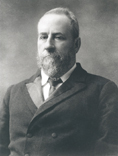| |
|
 |
Member for South Australia 1901-1903,
Adelaide (South Australia) 1903-1908 |
Charles Kingston was born in Adelaide, South Australia, where he was admitted to the Bar in 1873, and appointed as a Queen’s Counsel in 1888. Entering the South Australian House of Assembly as member for West Adelaide in 1881, Kingston became a dominant figure in South Australian colonial politics in the 1890s, and in the Liberal reformist government as Attorney-General and Premier 1893-99.
Kingston was a great advocate of federation. He represented South Australia at the Federal Council of Australasia in Hobart, in 1889, having secured South Australia’s entry to the Council in the previous year. He assisted Sir Samuel Griffith and Andrew Inglis Clark to draft the Constitution Bill at the National Australasian Convention in 1891. As President of the Australasian Federal Convention of 1897-98 he played an important role in reconciling differences between the large and small colonies on such matters as the powers of the Senate. In 1900 Kingston accompanied Deakin and Barton to London to monitor the passage of the Commonwealth of Australia Bill through the British Parliament.
Kingston was appointed Minister for Trade and Customs in the first Federal Ministry in January 1901. In March he was elected as a Protectionist to the House of Representatives to represent South Australia. After South Australia was divided into federal electorates, he was elected unopposed to the seat of Adelaide in 1903, and again in 1906. As Minister for Trade and Customs Kingston had the huge task of guiding the first federal tariff through the Parliament. He resigned from the ministry in 1903 over industrial arbitration legislation, and although invited to join Watson’s Labor government in 1904, did not hold ministerial office again.
Kingston died in office in May 1908. He had been appointed a Privy Councillor in 1897, and had declined a knighthood.
previous | list of members | next
|


